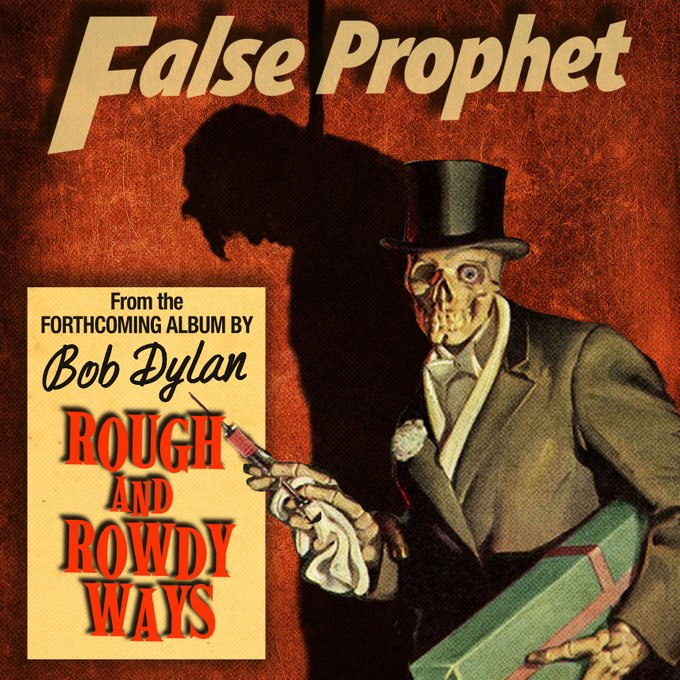HOLLYWOOD—The word Bard, borrowed from Gaelic and old Celtic, refers to a ‘poet-singer’ or ‘minstrel’, a wanderer who never set roots, traveling from town to town, with his string instrument and his love of stories. People would gather around to hear him sing, he didn’t need a melodious voice, his words would leave people spellbound. His folktales and epics would become legends.
If there ever was a bard for our times, it would be Bob Dylan. Joan Baez referred to him as the original vagabond in her song Diamonds & Rust, the lady did have a way with words. His songs challenge the paradigm of what we call music; long spoken verse poetry set to a limited number of instruments, sagas of good vs. evil, of freedom, justice, hope and equality, the closest thing we have to Homer’s Odyssey or Shakespeare’s The Phoenix and the Turtle.
Dylan has come out with a new album titled “Rough and Rowdy Ways”. After an 8 year hiatus, finally, a new album has dropped. The collection, slated for release on June 19, has already created quite a buzz. So far three songs from the album have been released, “I Contain Multitudes”. “False Prophet” and “Murder Most Foul”. All three songs are chock full of literary and musical references, from Chopin to Beethoven, from the Beatles to the Stones, the blues and jazz to the tragedy of Lady Macbeth, and everything in between.
Murder Most Foul is borrowed from Hamlet. It is the bard of today quoting the bard of yesteryear and everything comes full circle. The violin and piano set a somber, melancholy mood, his voice scratchy and hard, together they evoke a mood of contemplation, of nostalgia and hope. He takes us back to Dallas in 1963, the beginning of the end, the day the world stood still. Every generation has a unique scale of comparison, we measure current traumas against experiences from the past, and they’re usually found wanting. Millennials talk about 9/11, while boomers talk about the Vietnam war and JFK’s assassination, and it makes Dylanesque sense to talk of JFK in the time of Corona. The song is 16 minutes and 55 seconds long, the mood may be solemn but it ends on a hopeful note when he urges the unknown listener to play his favorite music from the past, music that would take our collective minds off of the current state of the world.
Dylan is known for lending his voice to the voiceless, the ones society casts aside, the ones who fall through the cracks; like Rubin ‘Hurricane’ Carter, Hattie Carroll, George Jackson, these tales of injustice were made immortal with his art. Small wonder then that according to an NPR show, Bob’s lyrics are quoted the most in legal writings and court rulings, he wins by a landslide, bringing up the rear are The Beatles, Springsteen, and The Rolling Stones. Of his vast repertoire, the most quoted lyric is from Subterranean Homesick Blues:
“Keep a clean nose. watch the plain clothes.
You don’t need a weatherman to know which
way the wind blows.”
He was born Robert Allen Zimmerman, and a common misconception is that he changed his last name to honor Dylan Thomas, the patron saint of non-conformists everywhere, those refusing to go gentle into that good night. But Bob has set the record straight, he says he doesn’t even like the Welsh poet much, leaning more towards Rimbaud. His book Tarantula is greatly inspired by the French author, and other literary giants as Blake, Kerouac, and Ginsberg.
With 39 studio albums and 94 singles, Dylan may be one of the most prolific writers in the world. He won the Nobel prize in 2016 for “having created new poetic expressions within the great American song tradition”. One doesn’t need to wonder why, we’ve all consumed copious amounts of his music, as quoted lyrics, as anthems of protest and defiance, as covers by our favorite bands. In fact, some covers were so well received, they surpassed the original in terms of popularity, think Hendrix’s electric “All Along the Watchtower” or Guns N’ Roses’ soulful “Knockin On heaven’s door”.
Back in 1969, Rolling Stone started a rumor by accident. As a joke, it ran a review of an album called “The Masked Marauders, a supposed supergroup with Dylan, Mick Jagger, John Lennon, Paul Mccartney, and George Harrison as members. The spoof gained so much traction that RS decided to run with it and hired an obscure band to record an album. The album reached 114 on the Billboard charts. In a case of life imitating art, Dylan and Harrison along with Tom Petty, Jeff Lynne, and Roy Orbison eventually did get together to form the supergroup “The Traveling Wilburys” and made some beautiful music.
He met the Beatles in the ‘60s, mishearing the line “I can’t hide” as “I get high” from their song “I want to hold your hand”, decided these were the sort of people he wanted to hang out with, showed up, joint in hand and the rest is history! Dylan enjoyed George’s company the most and the two remained close friends until the latter’s death in 2001.
“Rough and Rowdy Ways” is a treat for die-hard fans and new ones alike. It packs a wallop of reality, but it also infuses us with hope. Right now we need hope, empathy and perhaps love most of all. As the original bard said, “If music be the food of love, play on”.







